Top 07 Reasons to use Laser Scanning for Construction Projects in 2026
By 2026, the global construction market will enter a significant paradigm shift, characterised by precision, data-driven processes, digital twins,...
5 min read
![]() Brighter Graphics
:
Sep 29, 2022 11:26:00 AM
Brighter Graphics
:
Sep 29, 2022 11:26:00 AM
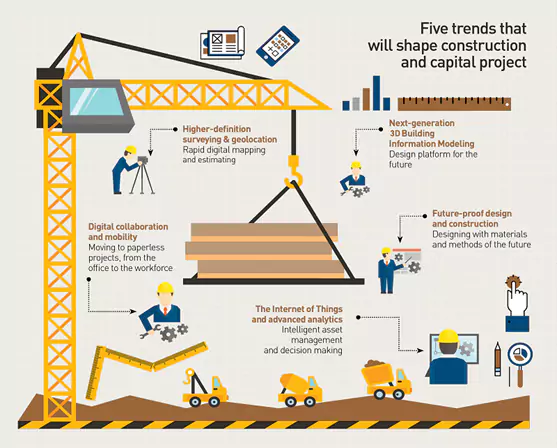
Despite having a gigantic share in the global economy, the construction industry was pushed to the bottleneck of growth during the COVID-19 pandemic. With challenges in terms of efficient project management, growing health concerns, and exacerbating team performance, the construction industry’s hesitation to adopt modern digital technologies triggered a chain reaction of crisis. Eventually, it pushed industry leaders and decision-makers to consider innovative digital ways to cope with the evolving challenges amid COVID-19.
Digital transformation demands a range of revolutionary changes in work culture and acquiring new resources to unleash the hidden potential of data-driven technologies that ensure improved collaboration, better team performance, and sustainable growth. It ensures the construction sector of growth in a highly competitive market, while also curbing the potential challenges related to project management and interconnectivity.
In an industry survey, Digital Transformation is a priority for 72% of construction firms worldwide. The urgency is felt most keenly in Europe, where 82% of firms are treating digital transformation as critical. The researchers also found that 32% of firms spend less than 3% of total turnover on digital technologies. The very best of intentions are useless without investment.
It is safe to state for firms gearing up to significantly increase their market share, digital transformation can provide the launch pad they require for a perfect take-off.
This article will shed light on some of the crucial ways for the construction industry, that digital transformation offers, for rapid growth in overall productivity and performance.
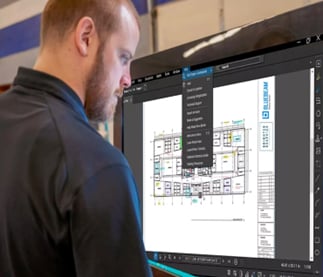 Digital transformation in the construction sector is intended to integrate innovative digital processes and technological methodologies in key areas of a construction business, increasing functional efficiency and reducing time to delivery.
Digital transformation in the construction sector is intended to integrate innovative digital processes and technological methodologies in key areas of a construction business, increasing functional efficiency and reducing time to delivery.
The most vital element of a digital transformation for the construction industry is adaptability to the change in work culture. Using state-of-the-art and reliable digital platforms can offer construction businesses a competitive edge over their competitors.
The construction industry has gone through some rigorous evolutionary changes in the last two decades. Nowadays, construction projects need to be more efficient, fast-paced, environment-friendly, and capable enough to address supply-demand issues in the post-pandemic world. Some of these challenges faced by the construction industry include:
Most construction businesses still depend heavily on outdated and manual workflows that result in poor tracking of ongoing projects, inefficient supply-chain management, and weak collaboration. This dependence on mainstream and outdated ways creates different distractions in the core business operations that lead to poor performance & productivity.
The global supply chain has been disrupted since the COVID-19 pandemic and it continues to worsen due to the ongoing conflict in Europe. As the world started coming back to normal after the pandemic, there was a dramatic demand pull from the construction sector. Still, most suppliers are failing to meet the tentative delivery deadlines for raw material used in construction.
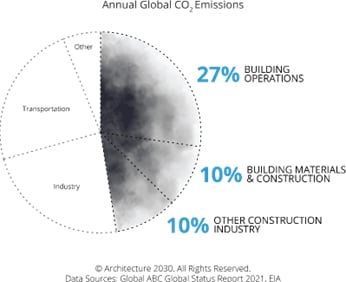 The built environment generates nearly 50% of annual global CO2 emissions.
The built environment generates nearly 50% of annual global CO2 emissions.
Of those total emissions, building operations are responsible for 27% annually, while building materials and construction (typically referred to as embodied carbon) are responsible for an additional 20% annually.
Regulatory bodies and environmental specialists are working in close collaboration to curb the environmental impact of various industries. Therefore, there is overwhelming pressure on the construction industry to reduce its carbon footprint and take eco-friendly initiatives.
Role of Digital Transformation in Combating Modern Challenges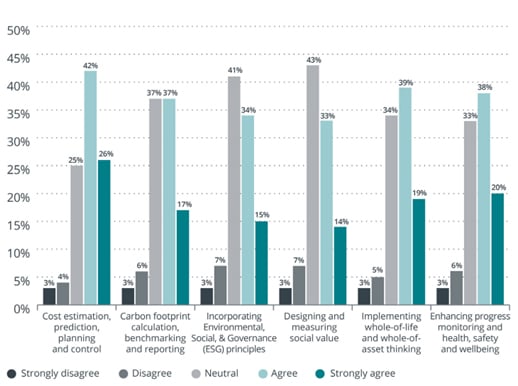 Figure 1: Responses to perceived improvements driven by digital processes and practices
Figure 1: Responses to perceived improvements driven by digital processes and practices
Digital transformation offers numerous rewards that the construction industry can be benefited from. Such as:
Architects, developers, designers, and project managers in the construction industry need to work in close collaboration with each other to create infrastructures that address their client’s requirements. Modern digital platforms like Bluebeam Revu can help acquire excellence in collaboration & interconnectivity by offering features like stored project files, simultaneous remote access, and scalable cloud storage.
A wide range of construction & design methods are based on tried-&-tested and routine tasks. Modern digital services can help you in automating these tasks using built-in templates and functions to ensure efficiency.
In the last decade, construction businesses started giving close attention to reducing the production of waste material and harmful emissions. With efficient planning, less use of paper material, and insightful data, digital technology can help the construction industry achieve this goal faster.
An absence of well-structured site management methods and poor communication among teams often causes delays and a significant loss of time, budget, and money.
The effective use of cloud-based collaboration alongside CAD BIM models, transparent inventory tracking, and remote access to the resources stored in the cloud has provided a solid ground for the construction industry to embrace the digital revolution. With an increasing number of construction businesses going digital, the industry continues to make a swift move towards:
The procurement of modern digital platforms or services has allowed the assessment and automation of various workflows. It results in maximum output with less time, budget, or resources. Thus, digitalization in the construction industry opens new growth opportunities, boosts ROI, and offers a sustainable work-frame.
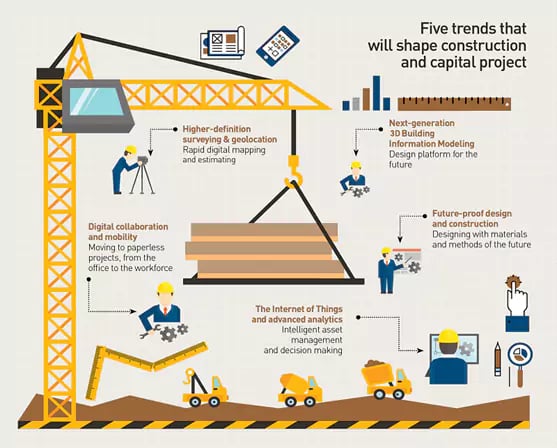
Figure 2: Five trends that will shape construction and capital projects
Data is the new oil and cloud services have added an ignition to it. Cloud services have opened new avenues for technological advances in the construction sector. With data, projects, and in-house frameworks moving to the cloud, all team members can leverage access to the key project areas, documents, and engineering or architectural drawings like never before.
Construction teams can now store, access, analyse, and manage various documents, PDFs, and data assets throughout the project lifecycle. It offers a rapid communication medium for all team members either working as on-site or remote employees. This barrier-free collaboration is instrumental in ensuring clarity, validity, scalability, and reduced costs.
Modern digital platforms like Bluebeam Revu are now enabling constructing teams to print Three-Dimensional PDFs directly from Revit®, SketchUp Pro®, or other 3D tools. These 3D PDFs can be marked up as easily as paper-based or 2D documents. Similarly, Bluebeam Studio, a collaboration utility allows your in-house and remote team to collaborate via live sessions and access project files or documents. Practically, it allows up to 500 individuals to simultaneously make changes and markup a single PDF document for clarity and flexibility of architectural designs.
Opting for a holistic integrated collaboration & delivery service like Bluebeam Revu is necessary to break silos among isolated teams. There is no doubt that an agile business model can only be achieved via a collaborative approach that aligns the entire project, tasks, and involved resources on a functional framework.
Managers & decision-makers can leverage such digital tools to regulate and control key aspects of a project, sharing fruitful insight among involved team members and tracking results. Therefore, digital transformation is going to revolutionize the construction industry from the design stage to project implementation & fulfilment.
As part of the RICS research titled “Digitisation in construction report 2022, respondents were asked to rank, in their opinion, nine “blockers” to the adoption of digital technologies, ranked using a scale of High, medium or low.
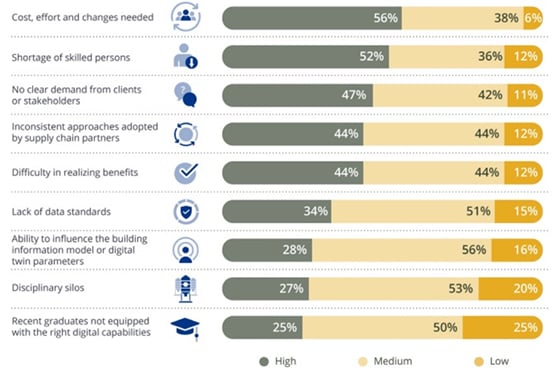 Figure 3: Blockers by function
Figure 3: Blockers by function
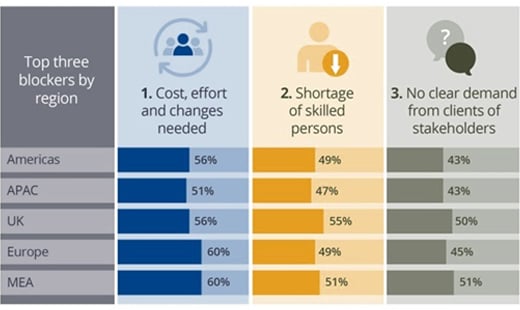
Figure 4: Top three blockers
The results from the survey make it clear that the transition to digital technologies demands careful consideration of use cases, in-depth risk analysis, and technical assistance. To fully leverage the remarkable advantages of digital transformation, construction businesses need to allocate their budget & resources smartly and encourage their workforce to break cultural barriers. Encouraging discussions, inviting subject experts, and employee training is instrumental in accelerating the rate of transition and breaking team resistance to employing digital technology. The journey starts with eliminating existing problems and leads to digitizing different workflows with regular inspections and QA.
Dependence on a paper-based & manual framework for project management and workflows means poor project visibility and communication. To break this potential barrier, over 2.5 million design & construction experts around the globe are using Bluebeam Revu. Bluebeam Revu, project efficiency, and collaboration solution is encouraging & assisting construction teams with smart digital tools to streamline workflows and get the job done faster.
By choosing Bluebeam Revu, construction teams can leverage quick access to the most recent PDFs, data sheets, and designs. By digitizing manual and paper-based workflows, construction teams can improve their time to market by up to 35 to 50% and make instant decisions based on easily accessible information & data.
There are a lot of challenges involved in revolutionizing the existing infrastructure and organizational culture to fully adapt to modern digital technologies like RPA, AI, digital mapping, cloud services, 3D drawings, data analytics, etc. But digital transformation is here to stay and the projected figures for construction businesses going fully digital by the end of 2022 are surprising with remarkable growth opportunities.
By 2026, the global construction market will enter a significant paradigm shift, characterised by precision, data-driven processes, digital twins,...
The new Bluebeam Revu update, version 21.8, is now available. The latest version focuses on simplifying workflows, improving collaboration, and...
When it comes to construction, “close enough” just doesn’t cut it anymore. Owners expect consistent schedules, contractors want zero rework, and VDC...